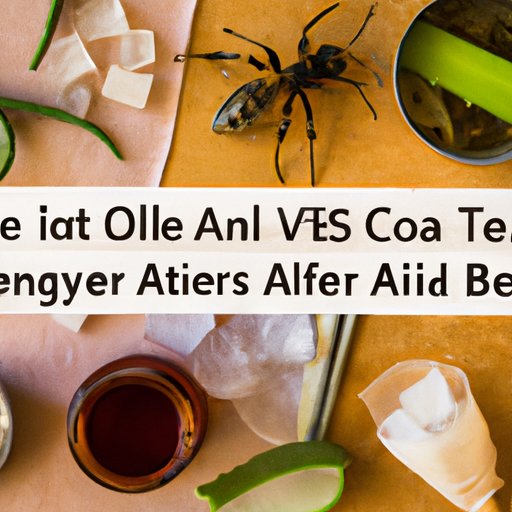
I. Introduction
Summer is a great time to explore the outdoors, but bug bites can quickly put a damper on your fun time. Bites from mosquitoes, ants, bees, and other pesky insects can cause discomfort, itching, and even pain. Thankfully, with a little know-how and some natural remedies, you can make bug bites stop itching and enjoy your time outside. In this article, we’ll explore several effective ways to soothe and relieve bug bites.
II. Essential Oils
Essential oils have become increasingly popular in recent years for their holistic health benefits. Lavender and tea tree oil are two essential oils that can help soothe bug bites. Lavender oil is known for its anti-inflammatory and antiseptic properties, while tea tree oil has antimicrobial, antifungal, and antiseptic benefits. Making your bug bite relief spray using these oils is an effective and natural way to relieve the itch.
To make your bug bite relief spray, you will need:
- 1 cup of distilled water
- 10-15 drops of lavender or tea tree oil (or a combination of both)
- 1 spray bottle
Step-by-step instructions:
- Mix the distilled water and essential oils into a spray bottle.
- Shake the bottle well to combine the ingredients.
- Spray the mixture onto your affected skin as needed.
III. Ice Pack
Applying a cold compress to affected skin can provide instant itch relief. Using an ice pack on areas that have been bitten or stung by insects can help soothe the skin, reduce inflammation, and numb the affected area temporarily. Making an ice pack at home is quick and easy.
To make an ice pack, you will need:
- A plastic bag or a towel
- A few ice cubes
Step-by-step instructions:
- Place the ice cubes into the plastic bag or towel, wrapping it up to make a small bundle.
- Hold the ice pack gently against the affected area for around 15 minutes.
- Repeat the process for up to 20 minutes every hour, if necessary.
IV. Baking Soda
Baking soda is an excellent solution for reducing the discomfort and itchiness of bug bites. When added to water, baking soda produces an alkaline substance that can neutralize the acidity of insect bites. This reduces irritation, redness, and swelling in the affected area.
To make a baking soda paste, you will need:
- 1 tablespoon of baking soda
- 1 tablespoon of water
Step-by-step instructions:
- Mix the baking soda and water to form a thick paste.
- Dab the paste onto the affected area and let it sit for around 10-15 minutes.
- Rinse the area with cool water.
V. Aloe Vera
Aloe vera is a natural solution for soothing and moisturizing skin. It is commonly used to treat burns, but it can also be effective for relieving skin irritation caused by insect bites. Aloe vera gel is rich in vitamins, minerals, and amino acids, all of which can help soothe the skin and reduce inflammation.
To use aloe vera for bug bite relief, you will need:
- Fresh aloe vera plant or aloe vera gel
Step-by-step instructions:
- Extract a small amount of fresh aloe vera gel or use store-bought gel.
- Gently apply the gel to the affected area.
- Repeat as needed throughout the day.
VI. Honey
Honey is a natural alternative to anti-itch creams and lotions that contain chemicals. It is a natural antibacterial and anti-inflammatory agent that can help reduce swelling and inflammation caused by bug bites. Honey can also help speed up the healing process for wounds and bites.
To use honey for bug bite relief, you will need:
- Raw honey
Step-by-step instructions:
- Smear honey directly onto the affected area.
- Let the honey sit on your skin for around 5-10 minutes.
- Rinse the area with cool water.
VII. Over-the-Counter Solutions
If natural remedies are not effective enough, there are several over-the-counter medications and creams that can alleviate itching caused by bug bites. These include creams that contain hydrocortisone, calamine lotion, or antihistamines.
Here are some recommended products you can try:
- Benadryl anti-itch cream
- Tecnu Calagel Anti-Itch Gel
- Cortizone-10
- After Bite
Make sure to follow the instructions on the packaging carefully for the best results.
VIII. Prevention
Prevention is key when it comes to avoiding bug bites. There are several strategies you can use to minimize the risk of getting bitten or stung by insects.
Here are some tips and advice for preventing bug bites:
- Wear insect repellent or use natural alternatives like essential oils.
- Cover your skin with long-sleeved shirts, pants, and socks when possible.
- Avoid wearing bright colors or floral patterns that may attract insects.
- Avoid standing or walking near stagnant bodies of water.
- Inspect and shake out your clothing and shoes before and after outdoor activities.
IX. Conclusion
Bug bites can be a real nuisance, but they don’t have to ruin your summer fun. By using natural remedies like essential oils, ice packs, baking soda, aloe vera, and honey, you can reduce the discomfort and itching associated with bug bites. Over-the-counter solutions like anti-itch creams can also provide relief. By taking preventative measures like wearing protective clothing and using insect repellent, you can avoid getting bitten or stung by insects in the first place. With these tips and tricks in mind, you can enjoy the great outdoors without worrying about pesky bug bites.




